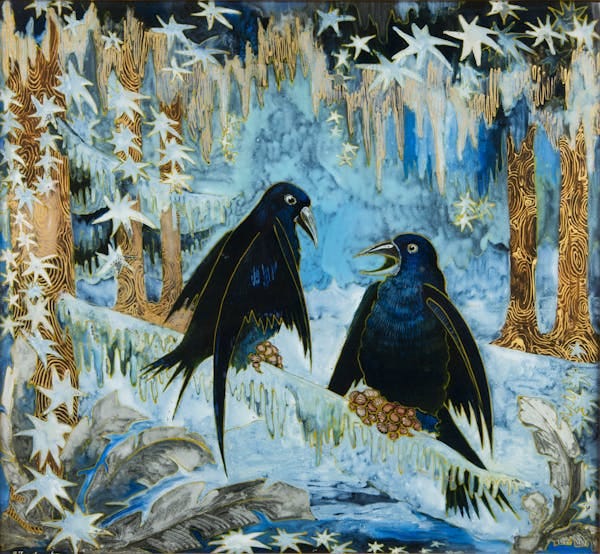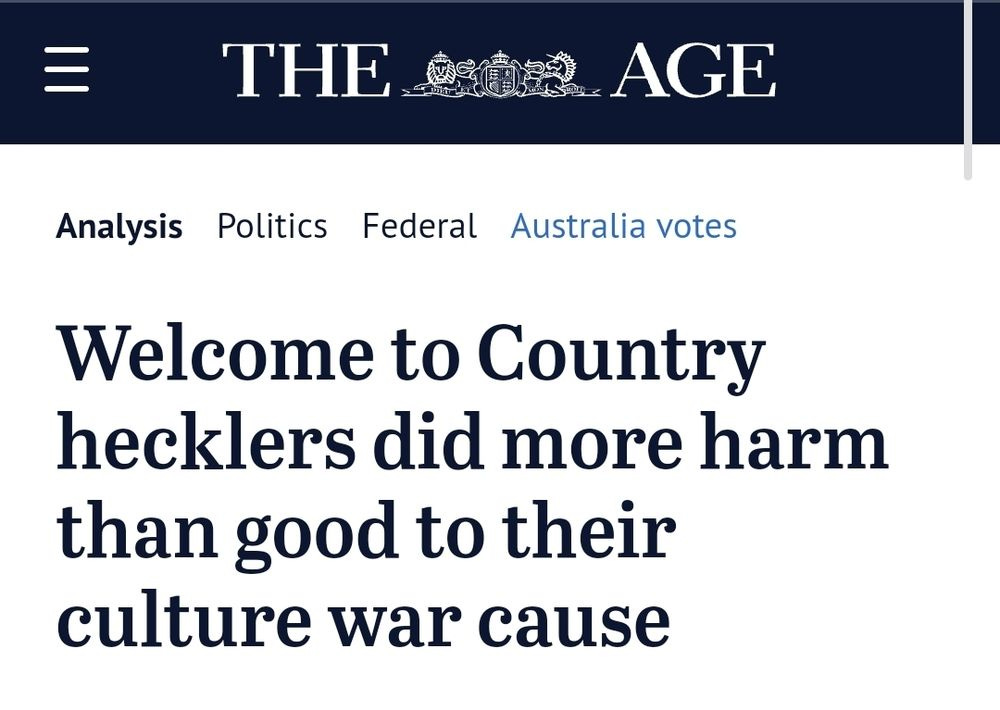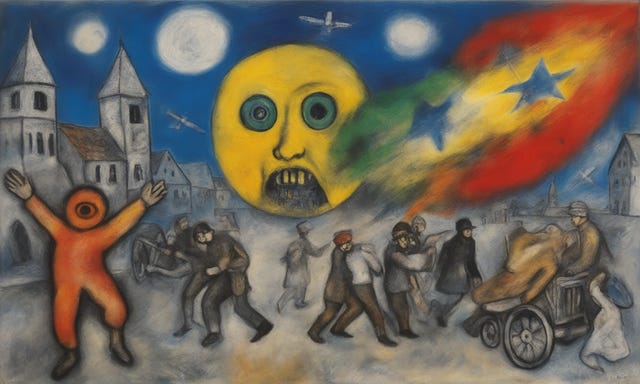One of the stories loading in background of my recent discussion of Australian politics is something that has come to a bit of head in the last week or so. As the Liberal Party has collapsed, the vacuum they are creating is increasingly being filled by the sort of right-wing extremism that has undermined democracy around the world. And we are nothing like ready for what is about to be unleashed.

The recent spate of organised neo-Nazis disrupting welcome-to-country ceremonies is the thin edge of a very large wedge, and of course, the media is falling for it hook, line and sinker.
As has happened in the United States, our political class, including the media, is being gulled into leaning into the controversy rather than recognising that you don’t give the “both sides” treatment to Nazism.
And here we are.
To put it another way, one of the key features of mainstream reporting in the Trump era is that they reframe actual Nazism as a messaging problem, and the welcome-to-country tactic is showing just how complicit the legacy media is in creating the conditions in which such ideas gain traction. This guileless piece in The Age is a classic example. Rather than reject the premise, it normalises it.
Channel Seven jumps on the bandwagon too, as Greg Jericho noted on BlueSky:
After the election, whatever the result—Labor majority or minority—the rise of this evil is going to be a key part of the next three years. The response of the Labor Party and the crossbench will be absolutely vital in containing the threat, and I will get into this more over the coming months.
For now, let me just set the scene by bringing out from behind the paywall a piece I wrote in August 2023, warning of exactly this development. Forewarned might not always be forearmed, but we need to get our heads around this stuff.
The Liberal Party doesn't need a majority to inflict damage on our democracy
The threat and possibility of minority power
There is this fantasy that the Liberal Party of Australia will somehow go back to their "moderate" roots, retake the teal seats, reassume dominance of "middle Australia", blah, blah, blah. This is unlikely to happen. The party mechanisms for doing so are corrupted beyond repair. But worse, the framing misunderstands the way in which conservative power is increasingly organising itself.
Perhaps, all political power in Australia.
To put it another way, that Liberal party no longer exists and a significant section of its “base” doesn’t even want to be “the party of Menzies”. Menzies may well be, in a sort of conservative irony, the forgotten person of Australian politics.
You can get into a cause-and-effect argument about this, but the reason the Liberal Party is melting, falling apart like a slow-cooked shoulder of lamb, is part of a worldwide phenomenon of democratic erosion led by the right flank of mainstream political parties, a mainstream media too broken to call it out, and extractive industries that are in a similar last-ditch grasp at power as these political organisations.
It took two world wars, two atom bombs and black-and-white images of people emerging from death camps after the defeat of Nazism to get enough people to rethink some basic tenets of human association and conclude that just maybe the staples of power—war, the inequalities of gender, race and wealth—now mixed with unsurpassed weapons of mass destruction, of annihilation, had to be addressed in a way that limited our ability to destroy ourselves or dehumanise those we judged “other”.
The two processes are intimately related.
We never reached a consensus on these matters, but for a while—after the Enlightenment, after the Second World War, after the Second Vatican Council, after the Vietnam War, after all those years and events—enough of us took this need for granted, or to heart, and we started building imperfect national and international institutions to help realise the underlying values. And while Martin Luther King Jr’s comment that the arc of the moral universe bends towards justice may well have been hopelessly aspirational—uttered to bring the concept into existence as much to reflect any given reality—people of my generation felt it as a truism.
Slavery in the US, apartheid in South Africa, the wholesale slaughter of Jews in the industrial scale death camps of Nazi Germany, the prosecution of child abuse within Holy Mother Church. Women’s liberation, freedom marches, equal marriage, rock and roll and rap. Powerful unions and the redistribution of wealth, progressive taxation, the separation of church and state. Universal suffrage, universal rights. In Australia, the Harvester Judgement, Medicare, compulsory voting and the AEC. The 1967 Referendum. Gough, finally.
Subscribed
I am painting with broad strokes here, while indulging in a little Jackson Pollack-like drip painting to fill in a few gaps, and thus tending to the abstract, but I don’t think I am misrepresenting the story in the space I have available, nor the haphazardness of the democratic process.
Two steps forward, one back, if you like.
It is important in a democracy that non-majority views are heeded, allowed for, and not just trampled, but we also need to recognise that a new form of minoritarianism has arisen in which a disgruntled faction of conservatism is employing a scorched-earth approach to democracy to engineer a supremacy they are sure is theirs.
Using democracy against itself.
What has arisen is a conservative vision steeped in patriarchy, white supremacy, inegalitarianism, authoritarianism and privilege, one that wants to crush all the diversity of the world into a grey and predictable monoculture and for the self-chosen few to sit atop big pile of money, devoid of any teleology other than more.
Some of them pass themselves off as Christians, but they are the biggest atheists on Earth, having completely transitioned from a traditional understanding of religion as frugality, good works, and service to the Lord rewarded in the next life, to one in which the goal is to prosper materially in this life and that’s it.
As the editor in chief of Christianity Today in the US recently put it, “multiple pastors had told him they would quote the Sermon on the Mount, specifically the part that says to ‘turn the other cheek,’ when preaching. Someone would come up after the service and ask, ‘Where did you get those liberal talking points?’
“What was alarming to me is that in most of these scenarios, when the pastor would say, ‘I’m literally quoting Jesus Christ,’ the response would not be, ‘I apologize.’ The response would be, ‘Yes, but that doesn’t work anymore. That’s weak,’” Moore said. “When we get to the point where the teachings of Jesus himself are seen as subversive to us, then we’re in a crisis.”
It is the greatest kenosis since god became man, an immense emptying, a black-soul, haunted-and-starved ideology of resentment and a blindness to beauty of any kind.
It’s not new: opposition to the arc of the moral universe bending towards justice never went away: read Ellen Willis, Audre Lorde, Angela Davis, Tony Kushner…I don’t know, any number of others through the sixties, seventies and eighties. Ellis wrote that the conservative backlash against the sixties was about a “denial that the sixties were real—and therefore consequential” and that this enabled the “use of the sixties as a dismissive label with which to quarantine certain ideas and attitudes.”
Once quarantined like that, all the ideas underlying “the sixties” could be demonised with safety, turned into “woke” and “reverse racism” and the like, transubstantiating decency and civility into something threatening: which to them, it was. It has been an alchemy worthy of Merlin.
The point I’m getting at—and this is what the Liberal Party of Australia is learning, as much through necessity as choice—is that you don’t need to be a majority party to advance this agenda. In fact, its power comes from its manufactured victimhood, uniting across class and gender differences. The Liberals are learning all this, of course, not just from the collapse of their own electoral support—with the transfer of mainstream legitimacy to independents—but from the Republican Party in the United States.
David W. Blight put it well back in 2020:
This new Confederacy is partly regional and also rural (a declining population). It knows what it hates: the two coasts, diverse cities, marriage equality, certain kinds of feminism, political correctness (sometimes with reason), university “elites,” and “liberals” generally. It is racial and undemocratic. It twists American history to its own ends, substituting “patriotism” for scholarship and science. It has weaponized “truth” and rendered it oddly irrelevant. It has brought us almost to a new 1860, an election in which Americans voted for fundamentally different visions of a proslavery or an antislavery future. For now, this minority interest fights for its existence from within the union by trying to own it.
The power of this minoritarianism also comes from the fact that many of its values are baked into the status quo, the institutional pillars that wield and represent power, and in the US, this includes the electoral system itself, which is open to endless manipulation through voter suppression of various sorts. It includes state governments like Florida who are not only banning abortion, curtailing women’s access to healthcare, reintroducing child labour—you think I’m joking?—and criminalising trans and gay people, they are also openly challenging things as basic as the wrongness of slavery.
This shit is being taught in schools.
At the moment, the full force of Australia’s disgruntled conservatism, the form that knows what it hates and feels no need to offer a vision of the future beyond the projection of that hatred, is focussed, like the eye of Sauron, upon the Voice to Parliament referendum. The Liberals may not be able to get a majority at the next election, but they will happily accept a No vote at the referendum in lieu, and they make no secret of the fact.
Phil Coorey reported last week that internal Liberal Party texts had one that said, “We can’t win the election unless we defeat the Voice solidly, ie we need to defeat it to get to the election starting line,” and it underlined a certain desperation—dressed up as ruthlessness—that will increasingly characterise the party as it ambles down the slope of its long decline.
Albanese’s oh-so-clever incrementalism plays into the hands of this, not least because of the fact that the prime minister misunderstands the nature of his own majority, such as it is, and I’ll come to that. The real problem the Voice faces is that it is being offered during a cost-of-living crisis, one that, for many people, is all consuming. It’s defeat—if it comes to that—will be the first significant triumph of the dark side of the new minoritarianism because, make no mistake, under the right circumstances, a majority for the Voice exists.
As I keep saying, the significance of the 2022 election was that for the first time, more than 30 per cent of people voted for someone other than the two major parties, and that this was part of a long-term trend. At that election, most of that 30 per cent fell to advantage of the independents and the Greens, but that won’t always be the case. It isn’t a swing vote in the usual sense: it is an infinitely malleable vote looking for somewhere to land.
Yes, it may land in such a way as to give Labor or the Coalition an outright majority, but the more likely scenario is that it is minoritarianiasm all the way down. The concept of majority government outside preferences, perhaps even a balance-of-power crossbench, will likely remain a rarity. Constructed rather than given.
The Liberal Party notion—as per that text leaked to Phil Coorey—that a No vote is the path back to government is misguided, and the fact that Liberals are saying such things means they haven’t really internalised the minority strategy. Why would they when their whole mindset has always been that they are the natural party of government?
But they’ll get there eventually, and our politics will—unless we are careful and lucky—increasingly be riven with the desperation of culture wars that are the only way the Liberal Party, and the media that supports them, can make themselves feel alive, make themselves matter, be damned the rest of us.
Their path back to government is hard to see, and No vote at the referendum is just as likely to nuke it—in the “teal” seats at least—as help it, but Labor are making it easier for them than they should be, running scared of their own shadow, and I mean that psychologically not metaphorically. Labor dream of being the “natural party of government” but they mix this up with being the Liberal Party, and the shadow emerges.
People are begging for policy that addresses all the big issues, the national, quotidian interests—housing, jobs, health, education, aged care, retirement, the fucking climate—ahead of priorities dictated by an out-of-touch political class and the moneyed interests they ultimately represent.
Priorities that speak particularly to a younger demographic that feel—quite rightly— they are being locked out of the shared prosperity an older generation took for granted, while being asked to solve a climate problem created by their parents’ generation.
The Greens are not immune to the threats of minority power either, though if they could get their act together, they may be rescued by it by overcoming the debilitating pressure that comes from the expectations that they “should” be a “big party”. There is no particular reason they should, though there is certainly room for them to grow their representation.
As for the community independents, they are both harbinger and augur of how all this might play out.
The “Voices of” independents have shown that community engagement not only works but that it is the only thing that saves democracy. So far, they have used their minority power well, but there are signs of faltering. They are learning to speak Canberran instead of English. They are letting themselves be distracted by nonsense like “hard Solo”. Their value to our politics is in following the evidence on big issues, putting pressure on the political class—via their kitchen table conversations and other community engagement—to cast an outsider’s eye and insist on fixing what is broken, from climate change down. As I wrote in Voices of Us:
They come to parliament not on the back of loyalty to a party, but loyalty to a community. They aren’t relying on politics to provide their life with its whole meaning, let alone their entire career. They can come in, set some goals, do some good, and then go back to the legal firm or the doctor’s surgery. It is a politics that is contingent but focused. Is this good for democracy? Undoubtedly. It ruptures the structures in which complacency and corruption grow. It undermines the cosy habits of the status quo. It reminds the establishment that governing legitimacy comes from the demos, the people, not the elites. It echoes the essence of self-rule the Greeks were trying to achieve though sortition and democracy itself. It is a landmine under the oligarchical mindset that is the inevitable endpoint of two-party politics.
The Liberal’s weakened position will force them down the US path of disruption and culture war to try and claw their way back into minority power, likely the only pathway left open to them. Where they can’t win, they will damage. Part of this might be a split and the rise of a more moderate faction, but by definition almost, that will be a minority party.
If you want a preview of what we are in for, listen to almost any utterance by Tony Abbott, including his recent bleating, ostensibly about the Voice, but about so much more:
“I’ll be voting ‘No’ to a few things. I’ll be voting ‘No’ to the Voice, sure, but I’ll be voting no to the climate cult, I’ll be voting out of the virus hysteria, I’ll be voting no to the gender fluidity crisis, I’ll be voting no to the ‘Magic Pudding’ economics. And I’ll be voting no to this crazy cultural self-loathing that afflicts this country, along with so many other countries of the English-speaking world, which should know better. And I say thank God that we the people are finally getting our say.”
A litany of resentment that is exactly as I have described, white, patriarchal, inegalitarian and resentful of co-existing with of all the groups they consider “other”.
Labor can save us from this particular hell by recognising now the advantage they have been handed as the early beneficiaries of minority power—remember, their primary vote was a mere 32.6%—and put together a progressive coalition by, not just through working with the independents and Greens on key issues, but by reforming things like campaign finance laws so that independents are not penalised by a system with a huge built-in two-party incumbency advantages. They need to make structural changes that lean into the new minoritarianism.
Unless the progressive minorities band together and devise a prosperous future for the majority, our politics will be riven with the sort of tribalism that is currently making the US increasingly ungovernable in any sane, democratic sense.







I’ve never understood trolls, and humour where you demean the other has never worked for me. My response has been to ignore them and hope they work out I’m not interested and sometimes to aim a death stare at them as well (I’m a teacher)😉 But it’s time to do more. To reclaim the discussion and to make a case loudly that we can’t have this garbage rule our lives. It’s a dead-end ideology where nobody is ever happy and everyone is furious at everything. Keep writing, Tim - your words help me each time
Thanks Tim. The reaction to the neo-Nazis and their disruption of Welcome's to Country is horrifying. What sort of sick, sad person is mortally offended by being welcomed?